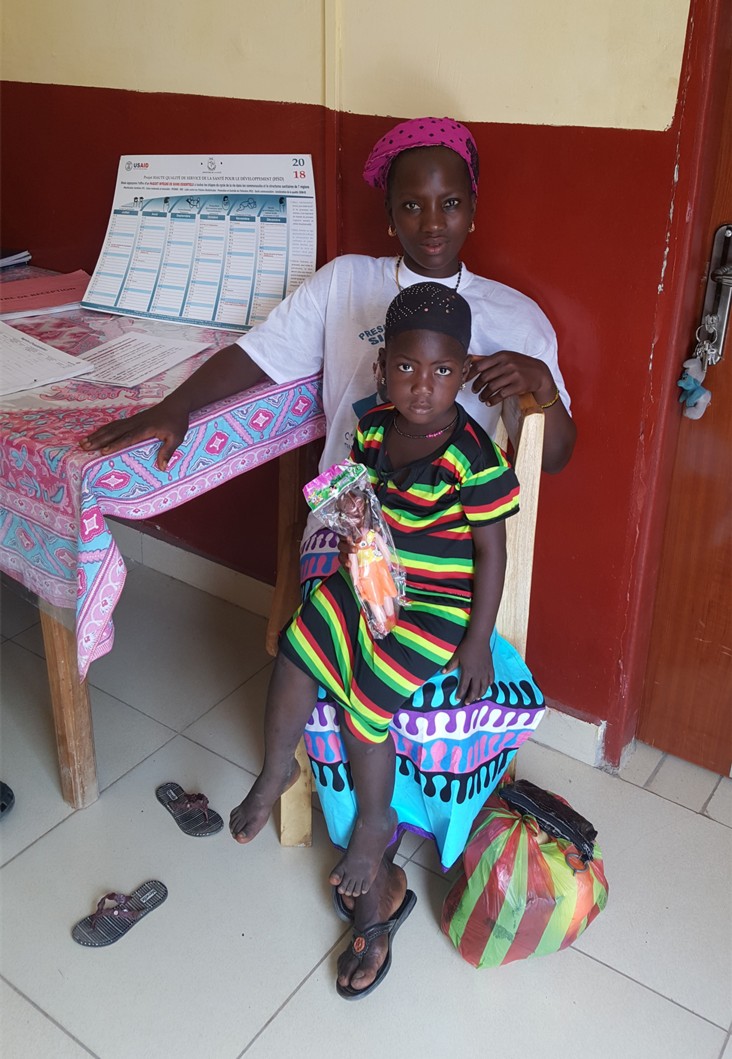Speeches Shim

June 2018 — The joy of being healed and returning to regular life beamed on the face of Bountou Sylla, a 21-year-old trader from Souguéta, a village 60 kilometers north of Kindia in the lower Guinea region. Sylla had suffered extremely painful complications during her second pregnancy.
“My problems started one night when I had severe stomach pain and started bleeding. My husband and I did not have much money, so we walked from the village in Souguéta to Kindia. I was very sad because, on arrival at the hospital, the baby did not survive,” said Sylla.
But the ordeal left her with serious lesions known as obstetric fistula, a breach of the pelvic-genital sector due to intense labor during delivery, causing incontinence and exposing her to a series of health problems. She received reconstructive surgery at the USAID-funded fistula care center in Kindia in January 2018.
However, a few weeks later, Sylla suffered a relapse, which resulted in a swollen stomach. “We called the hospital in Kindia but were told the next treatment session was in March. I spent the most difficult four weeks of my life waiting,” said Sylla. In March 2018, she underwent another restorative surgery in Kindia that was very successful.
In Guinea, obstetric fistula remains one of the most devastating postpartum lesions, affecting the most vulnerable and marginalized women in society and causing both medical and social complications. Many women end up abandoned by their families and ostracized by their community because of the condition.
Fistula care support is part of USAID’s Health Service Delivery project aimed at reducing child and maternal mortality in Guinea. For a more significant impact, the project is working to increase the number of fistula care centers in intervention areas while preventing fistula occurrences. These centers are designed to provide comprehensive care that includes daily meals, clean clothes, and transportation as part of the treatment, and community reintegration after treatment.
Surgeons have received training to perform fistula reconstruction in health facilities located in intervention areas. Since 2016, approximately 1,000 women have been diagnosed with obstetric fistula in Guinea, with more than 500 receiving successful treatment. A system has also been developed to follow up with women after surgery for at least one year to identify risks for recurrence or failure of repair and to propose remedies. According to Youssouf Kogbomou, director of the Kindia regional hospital, despite this achievement, there is a long way to go to fully disseminate fistula care and prevention services countrywide.
But fistula survivors like Sylla also have other needs beyond restorative surgery. Because of their social exclusion, most women are forced to give up their jobs or even their livelihoods.
“When I had this fistula, people did not want to buy the food I was selling. Even my family was desperate when they saw my condition, but my husband remained loyal and stayed with me throughout my care period,” recalled Sylla. “But now, I have been healed, and I can experience normal life once more.”
USAID’s Health Service Delivery project has set up centers for obstetric fistula treatment and reintegration services at the regional hospitals in Boke, Kindia, Faranah, Labé, at the prefectural hospital of Kissidougou, and at the Socio-Medical Center Jean Paul II in Conakry. The project has also rehabilitated 37 health facilities and has installed or repaired 14 incinerators in health facilities countrywide.
LINKS

Comment
Make a general inquiry or suggest an improvement.